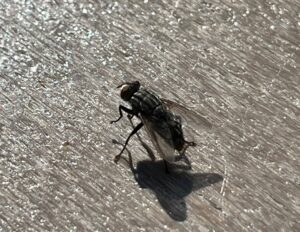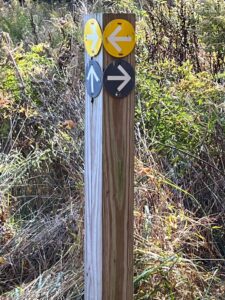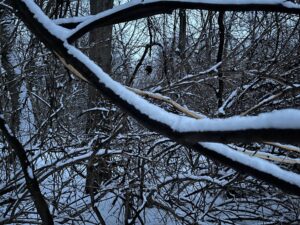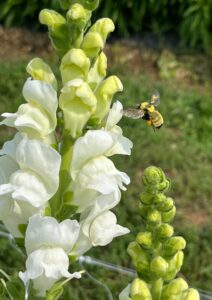There will be spring days ‘so perfect’
By Steven Brodsky
… as perfect as the day that’s featured in the poem “Today,” by Billy Collins:
https://www.poetryfoundation.org/poetrymagazine/poems/40824/today-56d21ebdad746
Such days foster expansiveness under a “larger dome of blue and white.”

Photo by Steven Brodsky
Those days will be perfect enough to possibly help to alleviate or eliminate impingements on one’s writing flow that may have set in over the winter.
Posted 3-31-25
Things that bug us
By Steven Brodsky

Photo by Steven Brodsky
Writers usually find it easier to shoo away or crush flies at spring, summer, and autumn picnics than to decide if they should write about some pesky (and personally troublesome) subjects.
If you’ll be attending picnics, enjoy them!
Nice (and easier) writing can arise from those picnics, whether or not flies and other external pests will be present.
Posted 3-28-24
The road I chose today
By Steven Brodsky

Photo by Steven Brodsky
… a road not made of asphalt, enables me to commemorate Robert Frost’s birthday, which arrives in two days, by sharing this link: https://poets.org/robert-frosts-road-not-taken.
Robert Frost was born on March 26, 1874.
I’m appreciative that Robert Frost chose a road that facilitated his penning “The Road Not Taken.”
Posted 3-24-25
The last vestige of light is present on these woods
By Steven Brodsky
… at the start of this snowy evening.

Photo by Steven Brodsky
Though I would like to linger at these woods, it wouldn’t be expedient: there are “promises to keep” and “miles to go before I sleep.”
The words between quotation marks in the above paragraph are those of the speaker in this poem by Robert Frost: https://www.poetryfoundation.org/poems/42891/stopping-by-woods-on-a-snowy-evening.
I have to move on from these woods and this post.
Thanks for stopping by.
Posted 2-12-25
A biblical admonition for writers and/or bookworms
By Steven Brodsky
Writers and/or bookworms (many writers are bookworms) may find Ecclesiastes 12:12 to be a catalyst to offset effects of excessive sedentary time with healthful activities.
Ecclesiastes 12:12: “And further, by these, my son, be admonished: of making many books there is no end; and much study is a weariness of the flesh.”
Be well!
Posted 2-10-25
A winged writing prompt
By Steven Brodsky
… prompted by Emily Dickinson’s “Fame is a bee” (linked below):

Photo by Steven Brodsky
www.poetryfoundation.org/poems/52139/fame-is-a-bee-1788
No telling when this prompt will take wing and disappear from this page.
Emily Dickinson did not experience the sting of fame; she was not famous during her lifetime.
Posted 5-4-24
In commemoration of the birthday of Robert Frost (March 26, 1874 – January 29, 1963)
By Steven Brodsky
… Let’s enjoy Robert Frost’s “Birches”:
“Birches” by Robert Frost (read by Tom O’Bedlam) (youtube.com)
https://www.poetryfoundation.org/poems/44260/birches
“Birches,” a song by Bill Morrissey, had been referenced in the main section of this column. I believe that Bill Morrissey probably titled the song as a nod to the same-named Robert Frost poem. Bill Morrissey spoke of the impact of Robert Frost’s poetry in an interview: “And then, as I got older, people like Robert Frost really hit me.” Bill Morrissey’s “Birches”: https://www.youtube.com/watch?v=Y5n5ceAv_Bc&ab_channel=BillMorrissey-Topic. I never had an opportunity to interview Bill Morrissey.
Posted 3-26-24
Longing to be ‘lost’ in a romantic interest
By Steven Brodsky
… the condition of the speaker of “I Am Not Yours,” a poem by Sara Teasdale (1884 – 1933): https://poets.org/poem/i-am-not-yours.
The first-person character of Paul Simon’s “50 Ways To Leave Your Lover” does not have that condition:
48 years ago, on February 7, 1976, “50 Ways To Leave Your Lover” reached the top of the Billboard Hot 100 chart for the first of three weeks.
The poem and song are referenced here in advance of Valentine’s Day.
Posted 2-7-24
‘The work of a writer, his continuing work, depends for breath of life on a certain privacy of heart.’
By Steven Brodsky
… Yes. For the purpose of maintaining “a certain privacy of heart,” will leave it at that; no flippancy is intended.
The quotation is that of Tennessee Williams. It appears in New Selected Essays: Where I Live.
It’s presented here in commemoration of the birthday of Tennessee Williams this coming Sunday. He was born on March 26, 1911.
Posted 3-24-23
One can only imagine
By Steven Brodsky
… how great Hubert Selby Jr.’s novel Seeds of Pain, Seeds of Love (the working title) would be if the novel had been completed.
Revisiting this reading by Selby of a few pages from the incomplete manuscript of the novel because the pages and the reading are powerful and not everyone here now watched the reading when a link to it was originally posted, and because the writing exemplifies what can be achieved by someone who never completed formal education beyond the eighth grade and who had some huge personal challenges, and because I hope that the reading will inspire writing by some of you, but be aware that the reading contains a depiction of violence upon a juvenile by a parent and adult language: https://www.youtube.com/watch?v=Q0wAJ8AFRmQ.
An outstanding documentary about Hubert Selby Jr.: https://www.youtube.com/watch?v=cvDJNEcUxfs.
This posting is dedicated to the memory of Dan Fante (February 19, 1944 – November 23, 2015).
Dan Fante was encouraged to write by Hubert Selby Jr.
Have you read Dan Fante’s memoir? It’s titled Fante: A Family’s Legacy of Writing, Drinking and Surviving.
Posted 12-5-22
Seamus Heaney’s father and grandfather used a spade. Seamus Heaney, a squat pen.
By Steven Brodsky
… digging tools.
Nobel Prize-winning poet Seamus Heaney at Villanova University in April 2010 reading “Digging”: https://www.youtube.com/watch?v=KNRkPU1LSUg.
The text of “Digging”: https://www.poetryfoundation.org/poems/47555/digging.
Seamus Heaney was born in Northern Ireland on April 13, 1939. He passed away on August 30, 2013.
Posted 2-2-22
Great color choice for the wheelbarrow in a 16-word poem by William Carlos Williams
By Steven Brodsky
… W.C. Williams chose red—an excitatory and perfect color for the wheelbarrow in the poem “The Red Wheelbarrow.”
Had he chosen any other color, the poem’s effectiveness would be greatly diminished.
Read or recite the poem from memory with a different color for the wheelbarrow and check this out for yourself.
https://www.youtube.com/watch?v=NqIl3oX_44s&ab_channel=awetblackbough
https://www.poetryfoundation.org/poems/45502/the-red-wheelbarrow
Posted 8-19-21